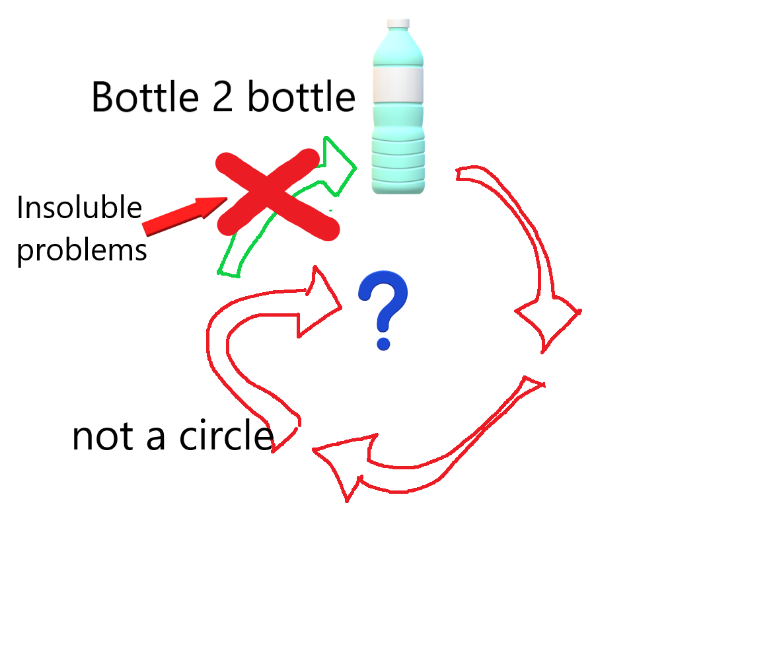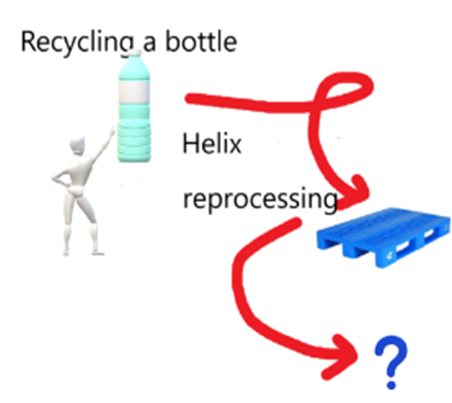

Words Which make Plastic Pollution Worse.
HI again everyone, Wizard here with more WIZARDWORDS.
This edition is on one of the most infuriating modern trends - ‘Buzz words’ as a way to talk about, or in this case, confuse the conversation, on what to do about plastic waste.
Let’s say the good part right up front –
Worthwhile ideas don’t need buzz words.
Clear, plain language is the most illuminating and best means to produce constructive debate on any important topic, particularly this one- words do matter. Conversely, when talking about solutions to the Plastic Waste Crisis, the assignment of ‘buzz words’, talking points, peculiar viewpoints and the like, are designed to influence, misdirect or confuse the argument, ostensibly to make it ineffective.
Who said it was Circle?
Let’s consider one of the worst examples of this disturbing trend: ‘CIRCULAR ECONOMY’ as a ‘solution’ to the plastic waste crisis. This buzz word seems to have surfaced in the 90’s but has risen to almost cult like status in the past decade. Its popularity is inexplicable because it literally doesn’t mean anything, it could even be counter intuitive (contrary to intuition or to common-sense). There is absolutely NOTHING in any ‘Economy’ which is ‘circular’ in particular, in the plastic reuse/recycling business – not only doesn’t it exist but it cannot exist - we’ll explain why.
‘Economies’ as everyone knows, are not a ‘thing’ but rather an idea, an explanation or a way to interpret, measure and to some extent, understand the world we live in. An ‘Economy’ can be a description of the effects of a system or the activity of a society (but not the system, activity or society itself). What an economy is not, is a description of the operational components and processes of a system: the inputs and outputs of production or goods and services are not an economy but the effects are. An Economy is no more a physical thing than our system of Money, which is more of an idea then an object. Consequently, it CANNOT be conceived or designed to follow a path, circular or not.
 By contrast, ‘Circular’ or saying that something resembles a circle means that it could be a physical thing which is traveling or following a circular path with no beginning or no end. Throughout the history of human thought, ‘circularity’ has been used in many instances, such as: circular definitions; circular logic; circular strategy; but all of these instances understand the basic nature of a circle: it is endless and keeps on rotating.
By contrast, ‘Circular’ or saying that something resembles a circle means that it could be a physical thing which is traveling or following a circular path with no beginning or no end. Throughout the history of human thought, ‘circularity’ has been used in many instances, such as: circular definitions; circular logic; circular strategy; but all of these instances understand the basic nature of a circle: it is endless and keeps on rotating.
A Package doesn’t make another package
Pundits often tout ‘the Circular Economy’ is the answer: bottle2bottle, reuse, reuse and such trying to evoke a ‘model’ which makes better use of resources. In the world of plastic packaging, there is not now and has never been, any possibility of a piece of packaging can become another identical piece of packaging through some sort of reprocessing, in an endless loop. It’s wrong to even suggest such a possibility as a practical solution. For even if it were technically possible (which is not currently the case), the ‘economics’(business case) are out of practical reach making such a notion absurd.
Whose Says it like that
The first difficulty is that ordinary consumers haven’t a clue and what a ‘circular economy’ is and what they are expected to do about it. It begs the question then: what are the ‘Circular Economy’ people on about and why? Are they deluded fools or serving vested interests with cunning mind-altering skills? Well, possibly both in many cases, is my most pessimistic assessment. For even if so called ’experts’ are preaching this gospel of meaningless daydreams to use consumers with the ‘best’ of intentions, they are very much fulfilling the aims of plastic producers who care only to ensure that we use more virgin plastic. They are not concerned about talk of apocalyptical predictions - the plastic industry has known since the early 60’s that recycling does not work as a business proposition- it’s just too expensive. They (plastic producers) want us to believe that recycling (it sounds better as ‘Circular Economy’) is all still possible otherwise their product could be seen as the cause of the next mass extinction - Ours.
 If an ‘expert’ were to be thorough and honest about the process of recovering plastic packaging and reprocessing it for use as another package, they would first have to deal with the obvious problem that it cost much more to do that than to make another package from virgin material (more than double in some cases). In addition, there are the process problems of: contamination; deterioration in characteristic of the material; costs of production process; and there is also the small matter of collecting enough of the ‘right’ kind of used packaging to make up an ‘economic volume’. The conclusion of this discussion is that any notion that a process can be ‘circular’ is just foolish and deluded because it never has and likely never will.
If an ‘expert’ were to be thorough and honest about the process of recovering plastic packaging and reprocessing it for use as another package, they would first have to deal with the obvious problem that it cost much more to do that than to make another package from virgin material (more than double in some cases). In addition, there are the process problems of: contamination; deterioration in characteristic of the material; costs of production process; and there is also the small matter of collecting enough of the ‘right’ kind of used packaging to make up an ‘economic volume’. The conclusion of this discussion is that any notion that a process can be ‘circular’ is just foolish and deluded because it never has and likely never will.
What it’s not - a Circle, it’s a Helix
The familiar linear production model of resource use to production to waste is not acceptable and has to changed, on that just about everyone will agree. However, its replacement should not an impossible pipedream but a far more plausible argument. The right idea is that other objects (not packaging) can be made out of collected and sorted plastic packaging- that is quite possible but it’s not a ‘circular’ system but more closely resembles a ‘helix’- ‘helix reprocessing’ (some people call this ‘downcycling’ but this is equally misleading). In this proposition the material doesn’t end up in the same place but moves along over time. There is an important difference between making a product say: a plastic pallet, from used packaging, to the idea that the plastic from a bottle can make another bottle or even be a component of a bottle. This distinction matters because concepts are creeping into legislation such as the recent Recycled Content Standard (RCS), where the cost of the material to comprise the RCS cost (a lot) more than the rest of the virgin content and so producers will inevitably cheat knowing that the Standard is unenforceable, whilst claiming their compliance.
Whereas, if there was an incentive to use reprocessed material by reducing say, the sales tax on the product (a plastic Pallet) then progress would truly be made. To claim the reduction the product should be proven to contain 100% recycled or reconstituted material, then there might actually be a point to this argument. Sadly, that isn’t the case at present and it’s not widespread in the conversation so long as this ‘Circular Economy’ nonsense’ dominating the airwaves.
Everyone has got it wrong
Understanding what are real ideas and what is just ‘spin’ in this field is not easy as there are many respected sources engaging in both. Regrettably, (I mean that sincerely) we have to call out even reputable organisations and experts who are falling into the trap of spinning ideas which are ‘mainstream’ but wrong or misleading. So, what to think when you see or read about Buzzwords like ‘Circular Economy’ - you should immediately treat the author with suspicion as an unreliable source. If they say something like the European Parliament definition “The circular economy is a model of production and consumption, which involves sharing, leasing, reusing, repairing, refurbishing and recycling existing materials and products as long as possible. In this way, the life cycle of products is extended.” * as in this definition, there is everything but a reference to material moving endlessly in a circle to recreate the source object, this is very much the idea of ‘helix reprocessing’ and should be heralded as such.
Our kids will pay
We owe it to future generations to urgently address this Crisis that we have created. Let’s start by Saying its Name clearly and without sponsoring false hopes of miracle solutions by buzz words, or ‘if only we can tweak this is or that’. No, it’s a Plastic Waste Crisis and the solutions are going to take fundamental change in the way this are done, particularly with plastic packaging which make up more than 45% of plastic production and perhaps 85% of environmental plastic pollution (more on this in later editions).
Being clear and accurate about what is and is not possible, economic or advisable, is what this Column is all about. The Wizard of Plasticmanina has no master nor guiding principle except: the truth; the mission to find the real answers to this crisis; and to demolish the imaginary ones.
More ‘Worse words’ will be discussed in the next edition of WIZARD WORDS
We continue,
Wizard of Plasticmania
*https://www.europarl.europa.eu/news/en/headlines/economy/20151201STO05603/circular-economy-definition-importance-and-benefits
Posted on 2022-04-20 18:54








Comments